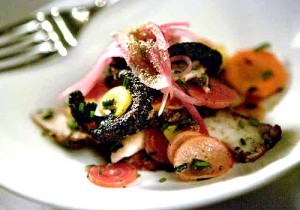Cooking for ourselves and others is inextricably one of the most important components contributing to good spiritual health. Not only do we rejoice with loved ones and friends over hearty feasts, but we share a piece of ourselves when we put together a dish that symbolically represents the cultures we come from or enjoy. Similarly, we appreciate someone else’s heritage in enjoying their foods. Cooking and eating a variety of plates not only creates memories of cherished experiences, but it also honors past experiences and the long history of cultures that have crafted recipes for generations and generations before us.
Because so much of a culture’s cuisine is based on the geography of its foundation (for instance, availability or cultivability of certain grains over others), societies all over the globe, together, create the greatest smorgasbord of culinary diversity. It is only right that we sample everything!
 The importance of eating foods from other cultures is one and the same with that of traveling to their homelands. Partaking in the cuisine of a culture is as rewarding as listening to its music, exploring its customs and rituals, or diving into its literature. The taste of a food, especially one so iconic to or intertwined with history, is a portal through that very history.
The importance of eating foods from other cultures is one and the same with that of traveling to their homelands. Partaking in the cuisine of a culture is as rewarding as listening to its music, exploring its customs and rituals, or diving into its literature. The taste of a food, especially one so iconic to or intertwined with history, is a portal through that very history.
Experiencing what a place away from home has to offer is a way of understanding its nuances—what separates it from other cultures, and by that very measure defines it. Cities along the Mediterranean have cuisines rife with fresh seafood, whereas land-locked equatorial climates have dishes full of grains. By visiting foreign lands we not only expand our palate and horizons, but we grow a sense of pride in our own cultures too. Sometimes, it takes a little distance to appreciate what has always been so close to us.